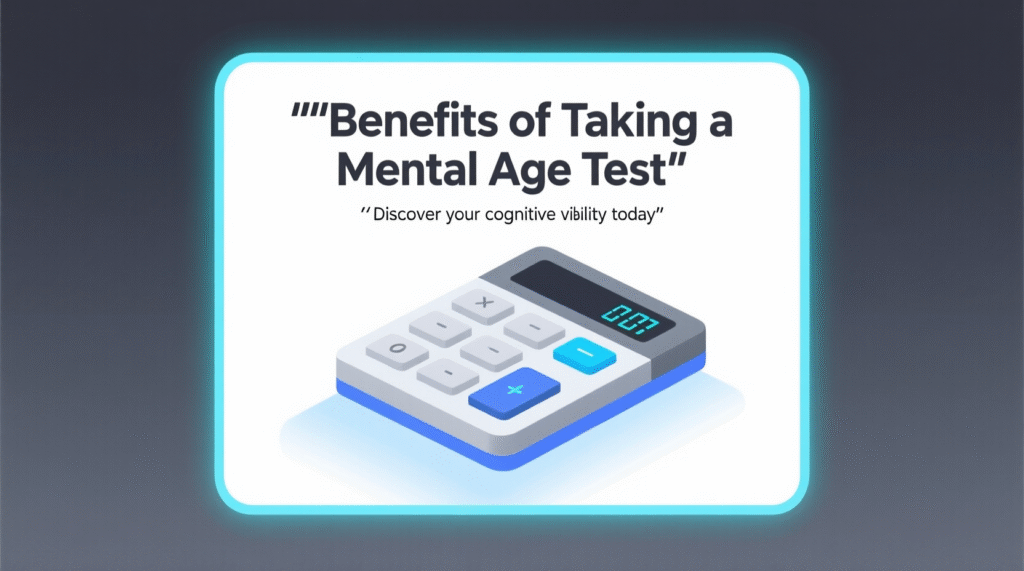
A mental age test gives you a snapshot of how your mindset, maturity, and outlook align with your actual age. The benefits include greater self-awareness, improved decision-making, stronger relationships, and clearer direction for personal growth.
Want to try it yourself? Take the Mental Age free and see how old your brain feels compared to your real age.
What Is a Mental Age Test?
A mental age test measures the way you think, feel, and react, rather than the number of years you’ve lived. Unlike chronological age (your real age) or IQ tests (intelligence measurement), it looks at maturity, emotional patterns, and personality traits.
It helps answer questions like:
- Do I think younger than my years?
- Is my mindset more mature than people my age?
- How does this affect my daily life?
Curious about your emotional development? Explore mental age vs emotional age.
Key Benefits of Taking a Mental Age Test
1. Improves Self-Awareness
One of the biggest benefits is learning how your inner self matches (or differs from) your actual age. This reflection helps you:
- Identify blind spots in maturity.
- Recognize strengths you may overlook.
- Gain a better sense of identity.
2. Enhances Emotional Intelligence
Understanding your mental age shows how you process feelings and handle challenges. This can help you:
- Spot emotional triggers.
- Strengthen empathy and patience.
- Build healthier communication habits.
3. Strengthens Relationships
Your mental age often shapes how you connect with others. Knowing it can:
- Reveal compatibility patterns with partners or friends.
- Prevent misunderstandings rooted in maturity differences.
- Help you adapt your expectations in relationships.
4. Guides Personal Growth
Your test results highlight areas for improvement. Whether you score younger or older than your real age, you can use it to:
- Set personal growth goals.
- Adjust habits that hold you back.
- Embrace qualities that make you unique.
5. Boosts Confidence and Validation
Sometimes, the test confirms what you already sense—that your thinking is wiser, younger, or more flexible than your years suggest. This validation can give you confidence in how you approach life.
Real-Life Example: Why It Matters
Imagine a 25-year-old who takes the test and gets a mental age of 35. Instead of seeing it as “too old,” they realize it reflects their responsible, stable mindset, which benefits their career. On the flip side, a 40-year-old who scores 28 may embrace their youthful curiosity and playfulness as a strength in creativity and relationships.
How to Maximize the Benefits
Taking the test is just the first step. Here’s how to use it:
- Reflect: Compare your mental age with your lifestyle choices.
- Discuss: Share results with friends or partners for deeper conversations.
- Track progress: Retake the test every year to see how your mindset evolves.
Learn how to boost your personal growth through ways to improve your emotional intelligence.
FAQs About Mental Age Tests
What are the benefits of knowing your mental age?
It helps with self-awareness, emotional growth, and improving relationships.
Does mental age affect decision-making?
Yes. Younger mental ages often reflect spontaneity, while older ones show cautious, logical decision-making.
Is mental age the same as IQ?
No. IQ measures intelligence; mental age reflects maturity and outlook.
Can my mental age change over time?
Absolutely. Life experiences, learning, and personal growth can shift it.
Is a higher mental age always better?
Not necessarily—each result has strengths. A younger mental age may mean creativity; an older one may mean stability.
- A full breakdown of advantages appears in benefits of taking a mental age test.
- How mental age shapes daily choices is covered in mental age and decision making.
- Growth patterns are explained in what affects your mental age.
- The impact on relationships is explored in can mental age impact relationships.
- Emotional maturity links are discussed in mental age vs emotional age.
- Why this insight matters is outlined in why is mental age important